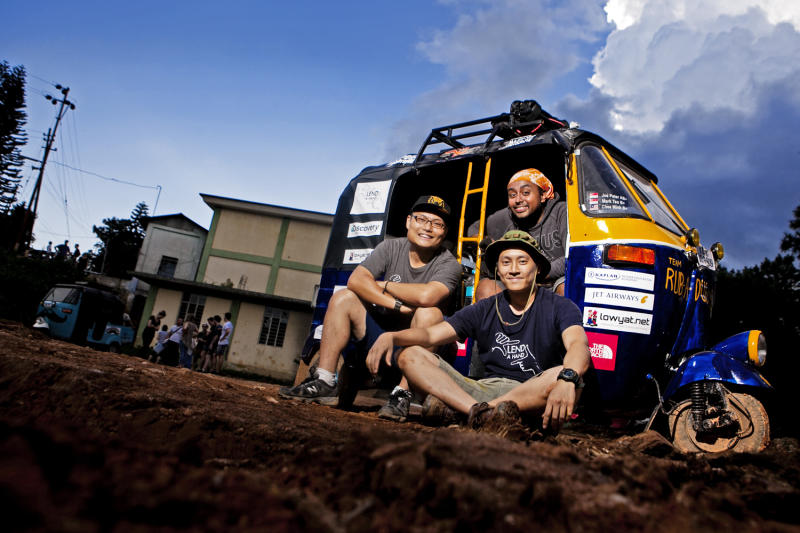
Malaysian photographer Geh Chee Minh (left) and his Singaporean Rickshaw Run teammates Mark Teo (right) and Joe Peter (back)
By IAN YEE
While most of us would feel pretty pleased with ourselves if we gave RM50 to support some poor kid in a third world country in exchange for a postcard, 28-year-old Geh Chee Minh has in the past few months raised nearly RM50,000 while risking his life.
Well sort of. Driving 3,500km across India in a tiny rickshaw over 25 days kind of constitutes life-risking, right? Oh, did we mention he shaved his head too (more on that later)?
Okay, time for us to give this some context. Professional photographer Geh decided to take part in The Rickshaw Run, an event which is exactly what it says it is – three people in a group driving one of India’s ubiquitous and infamously unreliable “tuk-tuk” rickshaws across India, just for kicks.
It was organised two months ago by British adventure organisation The Adventurists, who might as well be called The Absurdists. They come up with the most ridiculous adventure ideas, and participants are encouraged to set up charity funds to make their adventures more meaningful – since doing stuff like risking life, limb and inevitable food poisoning just to be absurd would otherwise be utterly meaningless. And absurd.
So Geh and two friends from Singapore – fellow photographer Mark Teo and producer-director Joe Peter – decided to set up their own charity initiative, LAH (which stands for Lend A Hand. Clever, right?), and sign up for The Rickshaw Run as their first project.
The idea was simple – the trio would use their photography/videography skills to post compelling updates on Facebook and Instagram, so people back home would be moved into supporting LAH’s charity of choice, FRANK Water, which funds clean water projects in India. And after that, they would hold a charity exhibition in Singapore of all their photos taken in India.
Well the idea was simple. Actually going through with it was a different thing altogether.
Harrowing journey
Geh’s team, Team Rub-A-Dub-Dub, was one of 69 intrepid trios who embarked on the Rickshaw Run, and he was the only Malaysian involved.
While it all started out rosy at scenic Shillong – where the teams met up, test drove their tuk-tuks, enjoyed the scenery and sampled the awesome cuisine – things went downhill pretty quickly after that.
“It was really bad,” said Geh. “After one week, I was like ‘I wanna get out of here’. Just 45 minutes after we all left Shillong, one of the other teams’ tuk-tuks got into an accident. The tuk-tuk was overturned and the windscreen was shattered. That’s when it hit me – this isn’t just fun and games.”
And indeed it wasn’t. You have to sign a waiver form with The Adventurists, they’ll teach you how to drive the tuk-tuks, and after that, you’re all on your own. See you at the finish line.
By the time they reached their destination, Geh’s team already had a few close shaves, literally. One was with a giant truck that sped right past them and shaved off their wing mirror. There was also the time an SUV ran their tuk-tuk right off the road.
Even more worrying was the fact that there were overturned trucks everywhere they went.
“You have to understand that this is a 145-cc rickshaw. That’s like a kapcai engine, carrying three of us with all our camera equipment,” said Geh. Not the most manoeuverable vehicle, then.
Geh also had to learn the hard way that as hardy as our Malaysian stomachs may be, they’re just no match for the food in India.
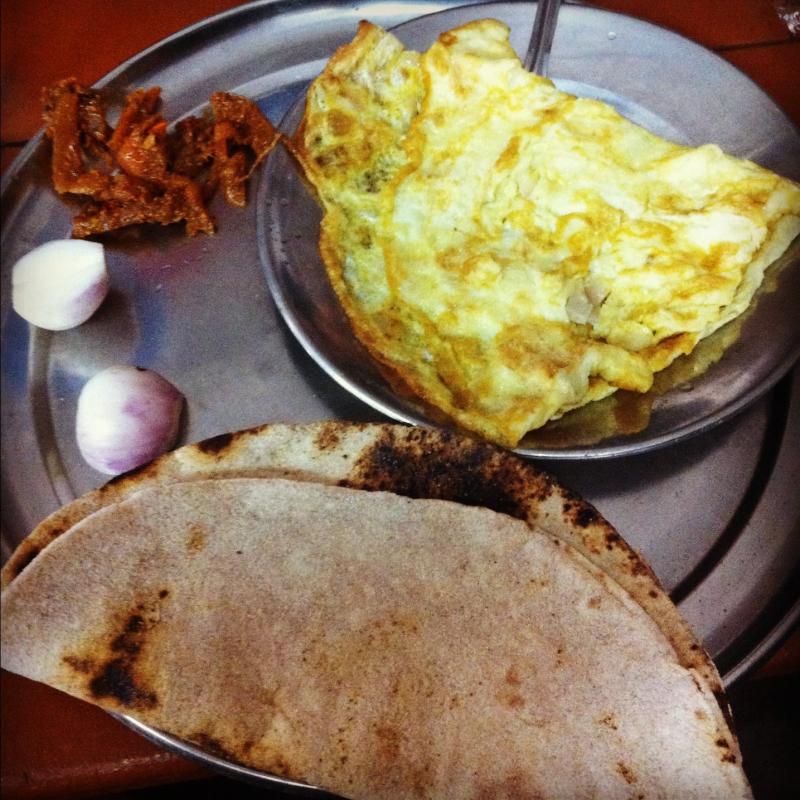
After getting sick a few times, Geh and his teammates shunned the street food in India, with this meal being the only exception - because it was prepared right before their eyes.
“I tried some meat dish when we hit the Taj Mahal, and that was it, I got the runs. That was the last time I had meat the whole journey. Vegetables are the safest, because you can’t undercook veggies,” he said. And that’s how he ended up having dhal every day.
His teammate Peter, on the other hand, had the “full package”. “He had fever, diarrhea, and was bed-ridden for an entire day.”
Cycle of poverty
But it wasn’t the physical dangers that bothered Geh the most. It was the extreme poverty he saw on the streets of India, and it was beyond what he could have ever imagined.
Most of what Geh saw wasn’t the charming, scenic India that many people imagine. The enduring imagine of India for him is that of mountains of rubbish, countless abandoned construction projects, and slums stuck in a vicious cycle of poverty.
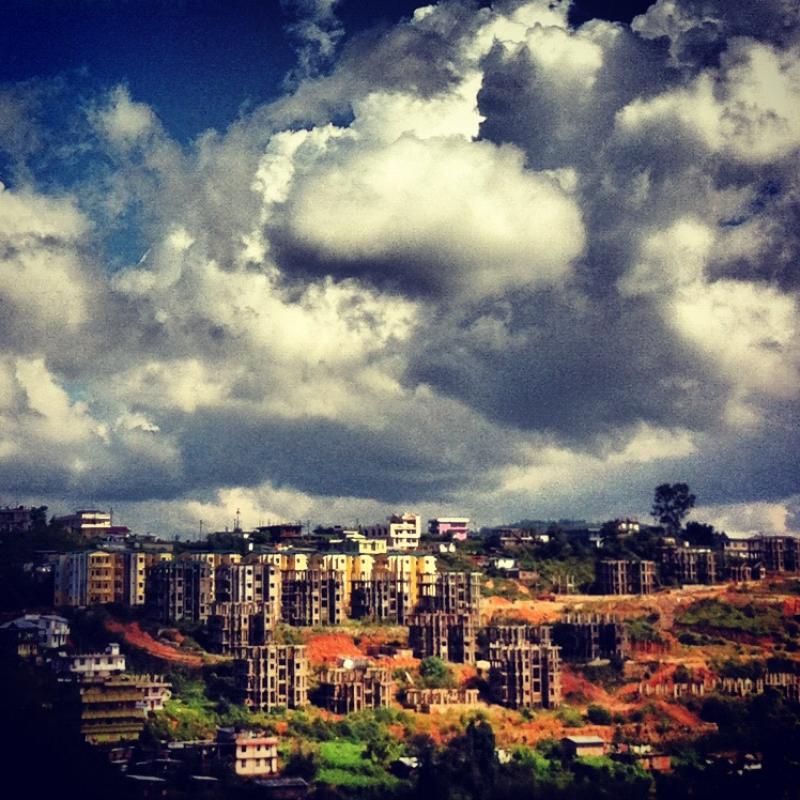
The extreme poverty and many abandoned development projects left Geh and his teammates extremely affected.
“I got really affected with how poor the kids are on the streets. It’s really heart-wrenching,” he said. “We were told that clean water was a real issue for the children there, and that water-related diseases were one of the top causes of death.
“But what we saw was a lack of education, and poor infrastructure. Even in the supposedly big cities, it’s just rubble everywhere. There’s a lot the country has to do.
“We were also at the Dharavi slums where they filmed Slumdog Millionaire, and it’s really very, very bad. It’s rubbish everywhere.”
Lending a hand
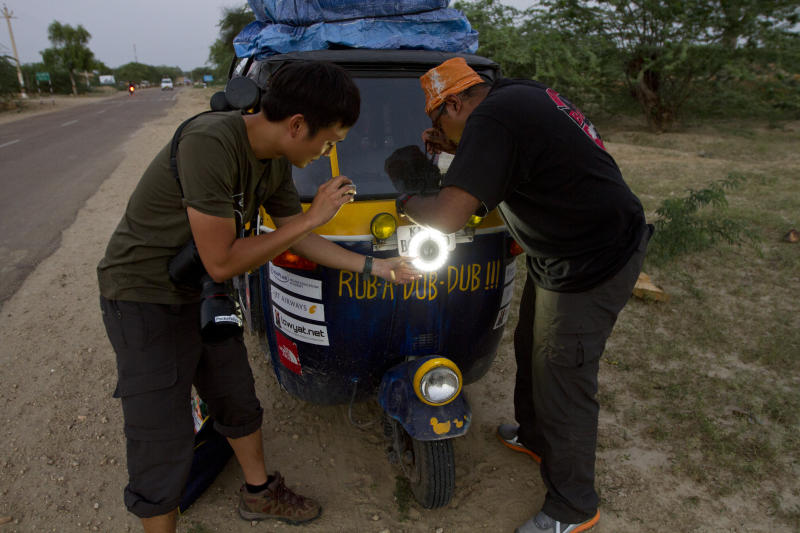
After their tuk-tuk battery got stolen, the guys had to mount their camera lighting on the tuk-tuk so they could find their motel for the night.
In spite of all that, Geh left India with a great impression of the people there – even though someone stole their tuk-tuk battery, which left them having to mount their camera lighting on the tuk-tuk so they could find their motel for the night.
But they also some good experiences with the people. When their tuk-tuk broke down, a passer-by helped them fix it on the spot. “He just poked around and fixed it,” said Geh.
When they got stuck at a state border once, not knowing that they were only allowed to pass during the day, they had to sleep at a truck stop; and one kind trucker allowed them to sleep on the back of his truck.
Despite having to “play charades” a lot, the locals mostly seemed to get the idea that what they were doing was for charity.
“They’re very curious in general when they see us driving one of their tuk-tuks, but when they found out we were doing it for charity, they responded very well to us,” he said.
The response from Netizens was equally good. They received many messages of encouragement in response to their posts on Facebook and Instagram, and their donation page (justgiving.com/lendahandsg) received contributions of over SGD10,000 (RM25,000).

A fellow Rickshaw Run participant getting some first aid treatment after an accident which left his tuk-tuk overturned and the windshield completely shattered.
Essentially, LAH’s Rickshaw Run campaign is just about three young, working professionals, combining their sense of adventure with clever use of online media in order to raise money to help others. And considering it’s only their first campaign, you have to say they’ve done amazingly.
Geh is open to the idea of embarking on another one of The Adventurists’ crazy adventures for charity. He’s just not sure if he’ll do the Rickshaw Run in India again.
“Let’s just say I won’t be going back (to India) as a tourist,” he quipped.
For more information on LAH’s charity Rickshaw Run through India, and to donate, log on to justgiving.com/lendahandsg.

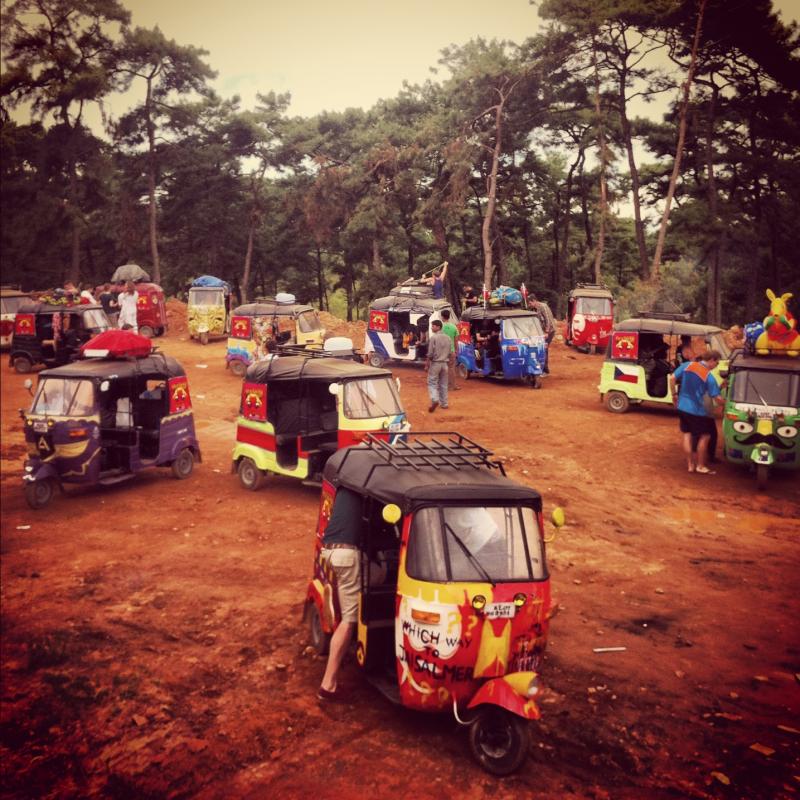
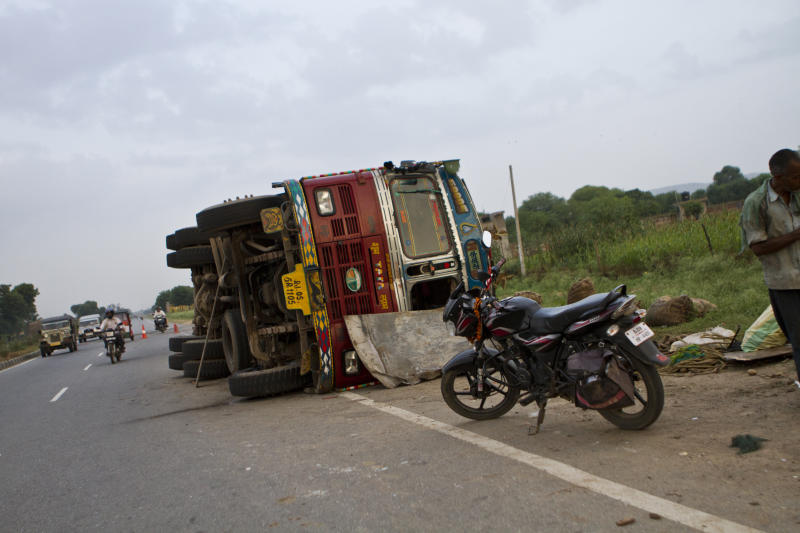

Tell us what you think!